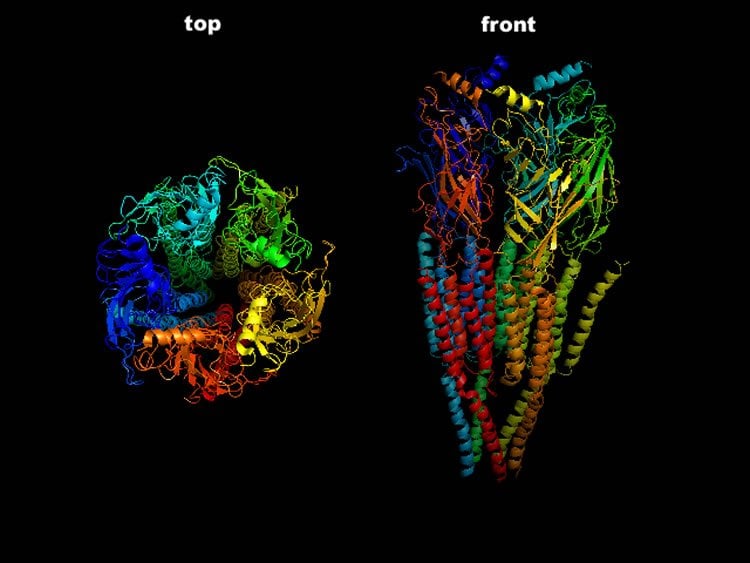Menthol acts in combination with nicotine to desensitize the type of nicotinic receptors found in lungs and airways that are responsible for nicotine’s irritation, say Georgetown University Medical Center (GUMC) researchers.
They say their findings, published online today in Molecular Pharmacology, suggests menthol is not just a flavoring, but has an important pharmacologic effect.
“In addition to desensitizing the receptors in the lung and airways, menthol appears to slow or prevent the recovery of sensitivity after the first insult, likely placing the receptors in a desensitized state,” says senior author Gerard Ahern, PhD, an associate professor of pharmacology at GUMC.
Ahern and his colleague say their study provides a better understanding of how menthol affects the function of the α3β4 receptor, one of the most prevalent nicotinic acetylcholine receptors expressed in the peripheral nervous system. These receptors are expressed in airway sensory nerves as well as other neurons.
“These receptors are also found in the brain, but we don’t know yet what effect menthol has on those receptors, or whether they contribute, in any way, to nicotine addiction,” says study co-author, Kenneth Kellar, PhD, a professor of pharmacology at GUMC.
The U.S. Food and Drug Administration (FDA) is considering restrictions on menthol cigarettes because it has determined that menthol in cigarettes is likely associated with increased initiation and progression to regular cigarette smoking in teens, and increased dependence, and reduced success in smoking cessation, especially among African American menthol smokers. But FDA’s review of the available research and evidence relating to menthol cigarettes, issued in July 2013, also concluded, “From the available studies, the weight of evidence supports the conclusion that menthol in cigarettes is not associated with an increase in disease risk to the user compared to non-menthol cigarette smokers.”

At the same time, the use of menthol cigarettes is especially high among African-American smokers, and research has shown a higher rate of lung cancer in African American smokers compared to other smokers.
“The issue may be that menthol in the presence of nicotine may reduce the irritation enough that a smoker can inhale more deeply, bringing not just nicotine but toxic smoke products farther into the lungs,” says Ahern. “While beyond the scope of this study, it is possible that such deeper inhalation of menthol cigarettes, to the extent it occurs, increases the already substantial health harms from smoking.”
In addition to Ahern and Kellar, study authors include Hoai T. Ton, Amanda E. Smart, Brittany L. Aguilar, Thao T. Olson of GUMC’s Department of Pharmacology & Physiology. The authors report having no personal financial interests related to the study.
Funding: A grant from the National Institutes of Health (DA012976) supported this research.
Source: Karen Teber – Georgetown University Medical Center
Image Credit: The image is in the public domain
Original Research: Abstract for “Menthol Enhances the Desensitization of Human α3β4 Nicotinic Acetylcholine Receptors” by Hoai T Ton, Amanda E Smart, Brittany L Aguilar, Thao T Olson, Kenneth J. Kellar, and Gerard P Ahern in Molecular Pharmacology. Published online May 11 2015 doi:10.1124/mol.115.098285
Abstract
Menthol Enhances the Desensitization of Human α3β4 Nicotinic Acetylcholine Receptors
The α3β4 nicotinic acetylcholine receptor (nAChR) subtype is widely expressed in the peripheral and central nervous systems, including in airway sensory nerves, which transduce the irritant effects of nicotine in tobacco smoke, and in certain brain areas that may be involved in nicotine addiction and/or withdrawal. Menthol, a widely used additive in cigarettes, is a potential analgesic and/or counterirritant at sensory nerves and may also influence nicotine’s actions in the brain. We examined menthol’s effects on recombinant human α3β4 nAChRs and native nAChRs in mouse sensory neurons. Menthol markedly decreased nAChR activity as assessed by Ca2+ imaging, 86Rb+ efflux and voltage-clamp measurements. Co-application of menthol with acetylcholine or nicotine increased desensitization, demonstrated by an increase in the rate and magnitude of the current decay and a reduction of the current integral. Pretreatment with menthol followed by its washout did not affect agonist-induced desensitization, suggesting that menthol must be present during the application of agonist to augment desensitization. Importantly, the effects of menthol increased with agonist concentration but exhibited neither voltage-sensitivity nor use-dependence characteristic of open-channel blockade. Interestingly, menthol slowed or prevented the recovery of nAChRs from desensitization indicating that it does not act as a typical competitive antagonist or channel blocker but instead probably stabilizes a desensitized state. Moreover, menthol at concentrations up to 1 mM did not compete for the orthosteric nAChR binding site labeled by [3H]-epibatidine. Taken together, these data indicate that menthol promotes desensitization of α3β4 nAChRs by an allosteric action.
“Menthol Enhances the Desensitization of Human α3β4 Nicotinic Acetylcholine Receptors” by Hoai T Ton, Amanda E Smart, Brittany L Aguilar, Thao T Olson, Kenneth J. Kellar, and Gerard P Ahern in Molecular Pharmacology. Published online May 11 2015 doi:10.1124/mol.115.098285






